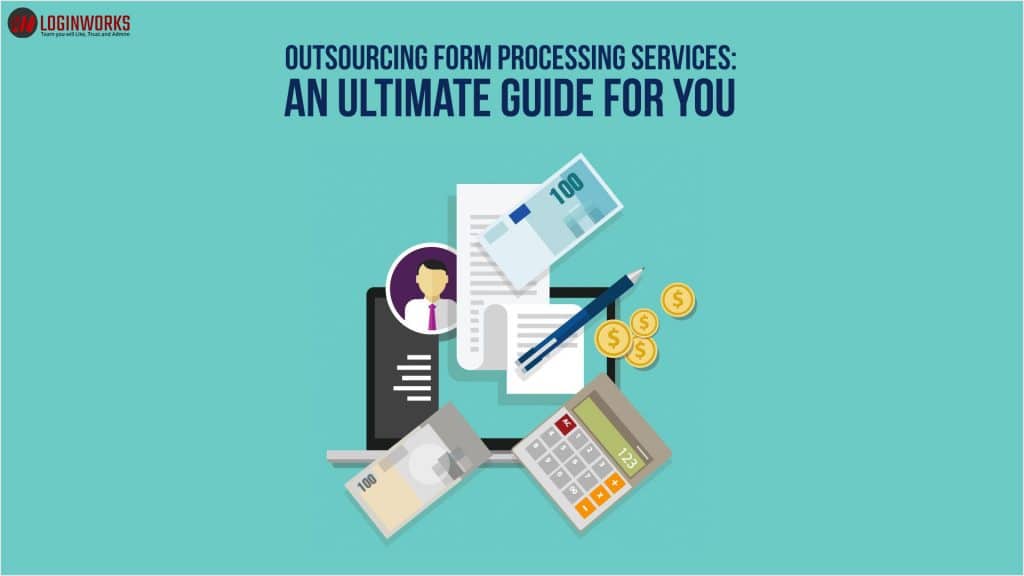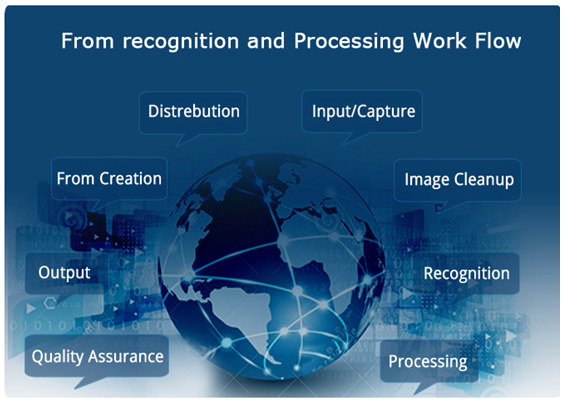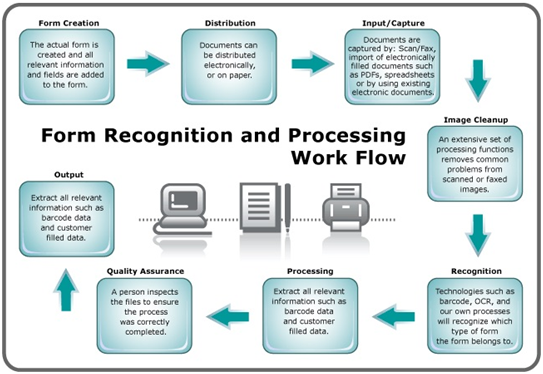Jump to Section
Definition of Form Processing Services
Form processing services are services that involve the processing of forms for use by businesses or organizations in their day to day processing of information or data. Most modern businesses and organizations use both electronic and manual forms, depending on use or requirements.
Both manual and electronic forms are commonly used, depending on data source and requirements. In manual forms, third parties, for example hospital patients or bank customers, fill in manual forms for internal use by the hospital or bank staff. These forms are initially produced by the organization with a pre-designed format, usually outsourced from external printers or form designers. Electronic forms are used mostly online, with templates or fields for data input.
Many businesses or organizations have resorted to outsourcing these services as they realize the cost-saving and time-saving effects of outsourcing. Due to labor and raw material costs, many western businesses prefer outsourcing by offshoring, especially from Asian countries like India and the Philippines.
Discussed below are three different things to consider when it comes to outsourcing form processing services. First, we shall discuss the benefits of outsourcing. Secondly, important steps a company needs to take when outsourcing. Finally, we shall look at the different methods or options available to a company that intends to outsource these services.
Benefits of Outsourcing Forms Processing Services
It is advisable for businesses or organizations to produce or outsource form processing services for the creation and formatting of their forms for the following reasons:
- It is affordable to outsource these services from third parties. A company would have to meet all the costs related to creation of forms, such as the purchase of printing machines.
- Outsourcing saves the company the cost of additional staff to oversee a form processing department.
- It saves time that would have been wasted creating forms, assuming that the resources were available. By outsourcing form processing services from companies that specialize in this service, production of required forms is done in record speed.
- Outsourcing form processing services from expert form designers has the advantage of producing well-designed or standard forms, which is a boost to the company’s image. For instance, well-designed invoices can help boost the image of the company in the eyes of clients.
- One great advantage of using forms in any business or organization is that a form can be used as a guide to work, and a way to make work easier. People filling in information on the forms are guided by the form’s description. Once a bank staff member or immigration officer hands the form to a client or applicant, they can fill in the form with little or no guidance, saving the company or institution a lot of time and work.
- Time, resources and efforts that would have been dedicated to production of the necessary forms are instead focused on the business. This makes the business more productive and profitable in the long run.
- A company that cares about customer satisfaction may opt to outsource form processing services. Well-processed forms or documents are a sign of a company that cares about its clients or customers, and gives that kind of impression to them.
- Because of the arrangement of useful information collected on forms, well-processed forms are a great way to ensure good record-keeping. Therefore outsourcing well-processed forms from skilled sources ensures that a company’s records are well classified and presented.
Steps a Company Needs to Take When (or Before) Outsourcing Form Processing Services
There are several things a company or business needs to consider before initiating the outsourcing process, and there are steps to be taken once the business opts for form processing services.
Before making the decision, a company or business needs to consider the following:
- Does the business need to outsource? Are the forms a major requirement in the business? Most big businesses find that they need some standard documents or forms for their internal processes and dealings with clients and third parties. Note that many form processing companies also process invoices and delivery notes, etcetera.
- Does the company have the resources to produce its own forms for its functions? If not, then outsourcing is a great option.
Once the decision is made that the business needs to outsource form processing services, then it is time to identify the right company to outsource from, and the right method. Again, this will depend on several factors:
- The Cost: It is of extreme importance to consider the cost of each outsourcing option. Depending on the cost, a company may decide to outsource by offshoring rather than outsource within the country. Sometimes, offshoring is the cheaper method. It is also wise to consider the amount charged by each company, in case the company decides to contract a company within its borders.
- The quality: For some companies or businesses, this consideration may override the cost. A business that wants to make a good impression or sustain a good image may opt for a more expensive, but expert, source to design its forms or documents.
- The reputation: It is important to ensure that the company that your company intends to outsource from has a good reputation. One way is by doing some online research. If there are positive reviews, then it is probably a good choice. A company whose homepage is filled with complaining clients may not be the best choice.
- Requirements or specifications: This depends on the type of forms required. Some companies specialize on one or specific types of forms. It is important to identify the companies that deal with a specific type of form or document processing to ensure quality and the advantage of experience.
Having considered all of the above, the business may initiate the outsourcing process. The following steps outline the process of outsourcing:
- Make a list of all possible form processing companies that seem to fit the outsourcing organization’s particular requirements.
- Contact the companies and ask for quotation. This is extremely important. This helps make comparisons in order to make the most viable choice.
- Once a choice is made, it is time to contract the right company.
- Test samples are extremely important in form processing. The outsourcing organization or business has the right to ask for samples. The most accurate or fitting samples are those based on a draft given by the outsourcing firm, along with their specifications.
5 Different Methods or Ways a Company Can Outsource Form Processing Services
Offshoring the services from overseas
This means that the company looks for an affordable, economically viable source outside its borders or across the ocean. Depending on cost of labor or cost of raw materials such as paper in the country of production, this can end up saving the company a lot of money, especially if they order the forms in bulk.
The Pros:
- For many organizations, offshoring is less costly.
- Some countries have more experienced companies in form processing, ensuring quality.
- Some companies find that offshoring gives them a lot of tax relief.
The Cons:
- Sometimes offshoring is prone to delays.
- Communication and cultural barriers can affect the flow.
Contracting the process to a different company
This involves gaining some rights from a third party to use their resources for the process of processing. The contract may be weekly, monthly or annual and is sometimes paid for and supervised by the company that requires the services. In this way, the outsourcing company is able to monitor the process closely.
The Pros:
- Saves the outsourcing company time.
- The outsourcing company has much more control than in methods like offshoring.
The Cons:
- Depending on the contract, it can be costly, especially if the contracting company has to foot bills like wages.
Outsourcing as a one-time project or on special occasions
A company that requires this service as a one-time requirement or in special cases may resort to a project-based outsourcing. For instance, a company may have a one-time promotion or survey and may outsource the forms on one occasion or occasionally.
The Pros:
- In this way, the company avoids long-term commitments like contracts and contractual fees.
- In this way, a business incurs costs only when very necessary.
The Cons:
- No long-term benefits of buyer-seller relationship
Internal Form Processing managed by a third party
under this arrangement, the company delegates the task of forms processing to an external source, who can carry out these processes within the premises of the company that requires the forms. This is another way to ensure control and to help monitor the process.
The Pros:
- Since this is done within the company premises, it is time-saving and saves on costs like transportation.
- It is one of the best methods for companies that wish to monitor the process.
The Cons:
- The business may have to endure inconveniences like having extra people in the premises and provide part of its premises for processing to take place.
Using experts not necessarily within the company staff to carry out these tasks
In this method, people who have the skills and the experience are hired to work on particular tasks for the company, regardless of location. This is similar to staff augmentation.
The Pros:
- This is a flexible method as it requires dealing with skilled individuals rather than companies or outsourcing from distant countries.
- This method is among the most affordable if a company or business can identify the best expert to hire for the job.
The Cons:
- It is one of the most risky ways of outsourcing as the hired expert may be available only through online contact.
- Unlike a company, an expert may be an individual and may prove to be unreliable.
Unless filled online, most processed forms are usually used not only for records but to transfer the information on the forms to computers for data storage and analysis.
Whether it’s a bank’s account opening forms, a small or large business outsourcing forms for its functions, a hospital’s health record forms, an immigration department’s forms or new student forms in educational institutions, an organization’s forms are usually designed according to the required information or the nature of the institution. Most forms have identical designs, depending on the purpose and requirements and the organization’s tastes. Most will also feature a logo, contacts and the company or institution name at the top or bottom.
Finally, it is important to outsource form processing services from one source at a time, unless the organization decides to upgrade or change format. Having one source do a company’s design and production for them creates a consistent image and ensures quality by design, which is a good thing for any company or institution.
- Business Intelligence Vs Data Analytics: What’s the Difference? - December 10, 2020
- Effective Ways Data Analytics Helps Improve Business Growth - July 28, 2020
- How the Automotive Industry is Benefitting From Web Scraping - July 23, 2020



